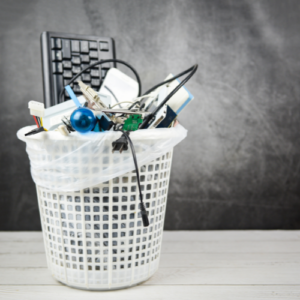HOW TO PROPERLY RECYCLE E-WASTE
Happy Earth Day! Earth Day is celebrated on April 22nd globally and marks the anniversary of the birth of the modern environmental movement in 1970. Earth Day raises awareness about pollution and ways to maintain a clean habitat. Keeping the environment clean and reducing pollution isn’t just important on Earth Day but every day. A simple concept to always remember and follow to help the environment is to reduce, reuse, and recycle which reduces the amount of waste and pollution. But do you know the proper ways to recycle different types of materials? In this blog, we will cover the proper way to recycle E-waste (Electronic Waste)
What is E-waste?
E-waste is all types of electrical and electronic equipment that no longer works or serves a purpose. Some examples of E-waste would be major appliances (refrigerators, washing machines, dryers, etc.), small appliances (vacuum cleaners, irons, blenders, fryers, etc.). and computer and telecommunication appliances (laptops, PCs, telephones, mobile phones, etc.).
Why should you recycle e-waste?
There are proper and improper ways to dispose of e-waste. Improper disposal includes leaving your e-waste on the curb for the garbage truck to pick up and take to a landfill. Most e-waste materials will not be picked up by the local garage company. For example, a TV will not be picked up by the garbage truck. E-waste should not be taken to landfills because of the dangerous chemicals they contain. E-waste is made up of deadly chemicals such as lead, cadmium, beryllium, mercury, and brominated flame retardant. E-waste that is not recycled properly increases the chances of these dangerous chemicals contaminating the soil, polluting the air, and leaching into water bodies.
Ways to properly recycle e-waste
So, what are the proper ways to recycle your electronics? Here are some options:
- Give your electronics waste to certified e-waste recyclers.
- Look up your local certified e-waste recyclers. You need to find an e-waste recycler officially certified by the Basle Action Network (BAN). The certified e-waste recycling non-profit organizations are dedicated to recycling e-waste safely and responsibly. But you may have to pay a small fee to recycle certain electronics. The fee is worth paying because the e-waste is being recycled safely and responsibly!
- Sell or donate outdated technology.
- Even though your technology is outdated someone else might still want it, but make sure it works properly before selling or donating it. Some places you can try selling them on are Craigslist, eBay, garage sales, and the Facebook marketplace. Try donating them to places such as Goodwill and The Salvation Army.
- Search electronics companies that take old electronics.
- Look up electronic companies that pick up old electronics or have an exchange policy where they take back old gadgets when you buy a new version. For example, Best Buy has the most comprehensive appliance and electronics recycling program. Best Buy stores accept most electronics, with a few exceptions. They will also haul away major appliances from your home for a fee of $29.99.
*Important: Always delete all the important and personal information off your electronics before you donate, sell, and dispose of your electronics.

